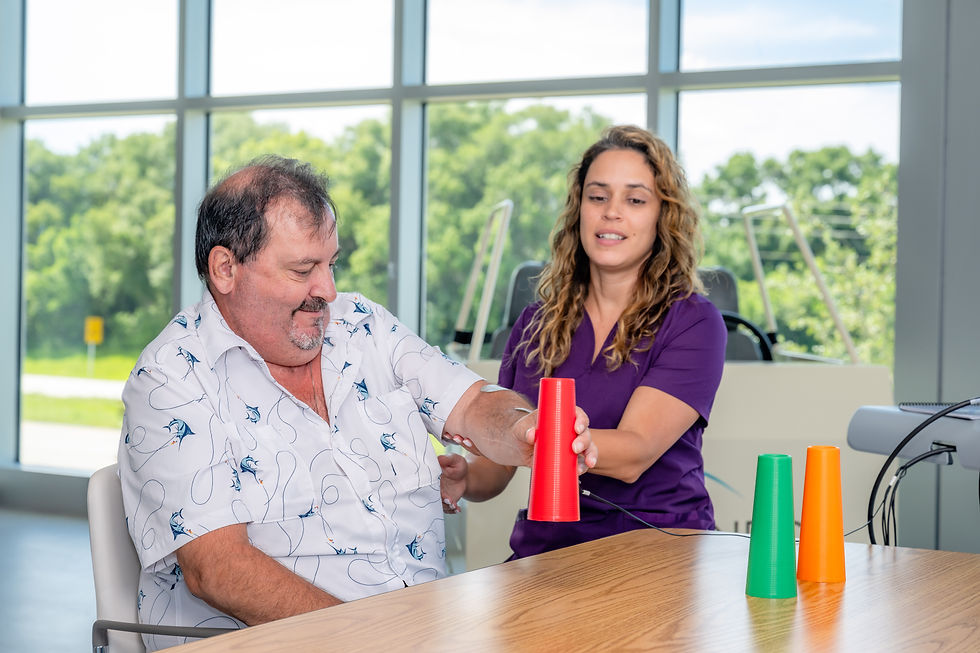Collaboration with Case Management is Key to the Quality of Life for Stroke Patients
- Tulsa Rehab Hospital
- Oct 9, 2023
- 4 min read
Written by Gina Thomas, MBA, RN, Chief Development & Public Relations Officer
Multi-disciplinary collaboration between the patient and the clinical team, which includes the Case Manager, is critical in managing many debilitating diseases. In many settings, the case management team can be a combination of case managers and social workers, and for this article, we will use the term case manager, which may mean one or both titles. This article will focus on the importance of case managers to the patient’s recovery after an acute onset of a stroke or the residual effects of a previous stroke.
Stroke is one of the leading causes of serious disability and death in the United States.1 Additionally, stroke has been on the rise since the onset of COVID-19, which has led to greater complications. Later in this article, we’ll highlight one patient’s successful recovery after several COVID-related complications. Stroke has been listed in the top 6 leading causes of death in Oklahoma. Quick treatment and stabilization after a stroke, followed by intense stroke rehabilitation, increases the chances of the patient improving function. The Case Manager, in collaboration with the clinical team and physician, provides guidance and direction for each stroke patient and their family or caregiver as their condition stabilizes immediately following a stroke in the short-term acute care hospital. Depending on the type of stroke, the patient may need different types of rehabilitation and resources that the Case Manager will provide and facilitate.
A study comparing functional improvements after a stroke has been published to determine the best level of care for a stroke patient.2 The clinical team and case management, in coordination with rehabilitation clinicians, can evaluate the patient to determine the best course of therapy for the greatest outcomes. Patients who can endure intense stroke rehabilitation in an inpatient rehab program have the greatest outcomes and the ability to function at the highest level possible and return to their own community. The patients who meet the criteria for intense stroke rehabilitation (average of 3 hours per day) in a rehab hospital will have an individualized plan of care developed for them, and, depending on the type of stroke, the treatments may include physical therapy (mobility, strength, coordination, and balance), occupational therapy (address activities of daily living, fine motor skills and upper extremity range of motion to perform daily tasks such as showering, dressing, eating and socializing with family and friends) and speech therapy (speech exercises and cognitive therapy). The Case Manager is often seen as a patient advocate and a liaison between the rehab therapy team and the patient and family. The clinical understanding by the Case Manager helps the stroke patient and family understand their progress and how these therapy services will facilitate that progress to live life as independently as possible.
As a part of the clinical team, the Case Manager at the rehabilitation hospital coordinates the length of stay management within Medicare (CMS) guidelines. The length of stay at the rehabilitation hospital requires frequent communication with the patient and the family as the patient progresses and improves. Throughout the course of the inpatient rehabilitation, the
Case Manager collaborates with the clinical rehab team to understand the patient’s progress and facilitate communication with the patient and the patient’s family and aides in determining and arranging the resources the patient may need to continue their rehabilitation once they leave the rehab hospital. Case Managers can assist with follow-up appointments such as outpatient rehab therapy, in-home assist devices, and access to support groups and also guide the family and caregiver in how best to continue the improvements in the level of function desired.
Some patients may be too weak following a stroke to undergo intensive rehabilitation and may need more recovery time to gain strength. In situations where patients need more recovery time or stabilization, they may need to stay in a short-term acute care hospital, skilled nursing facility or a long-term acute care hospital before being referred to an intense rehabilitation hospital. The Case Manager’s expertise and guidance during this process are important to ensure the patient has the highest opportunity to improve in the most appropriate clinical setting.
Let’s talk about an active, elderly patient who had experienced a significant health impact from COVID, which led to additional complications that resulted in a deterioration of his condition. He had endured sepsis and acute hypoxic respiratory failure. After medical stabilization at acute care short-term and long-term hospitals, he was admitted to one of our rehabilitation hospitals for intense medical rehabilitation. He had also become severely depressed from his inactivity, and his daughter was concerned that he had lost his will to live. The clinical rehab team, along with the Case Manager as the patient advocate and the patient’s daughter, set goals of returning this patient to his life without oxygen and overall improved mobility. The patient succeeded in achieving these goals plus a few more! The Case Manager stated that the patient “made a 180, was walking out of his room talking with his daughter and the rest of the rehab team.” His physical and mental health significantly improved, and he was discharged with a smile on his face.

With a focus on addressing the physical, cognitive, psychological, social, educational, and work-related needs, the Case Manager collaborates with the specialized stroke rehabilitation team to create a comprehensive, well-rounded individualized stroke rehab
program using specialized therapeutic modalities designed for optimal functioning ability.
For more on stroke and heart disease, visit - Oklahoma | American Heart Association
For more on stroke rehabilitation services please visit - Stroke Rehab | Tulsa Rehabilitation Hospital











